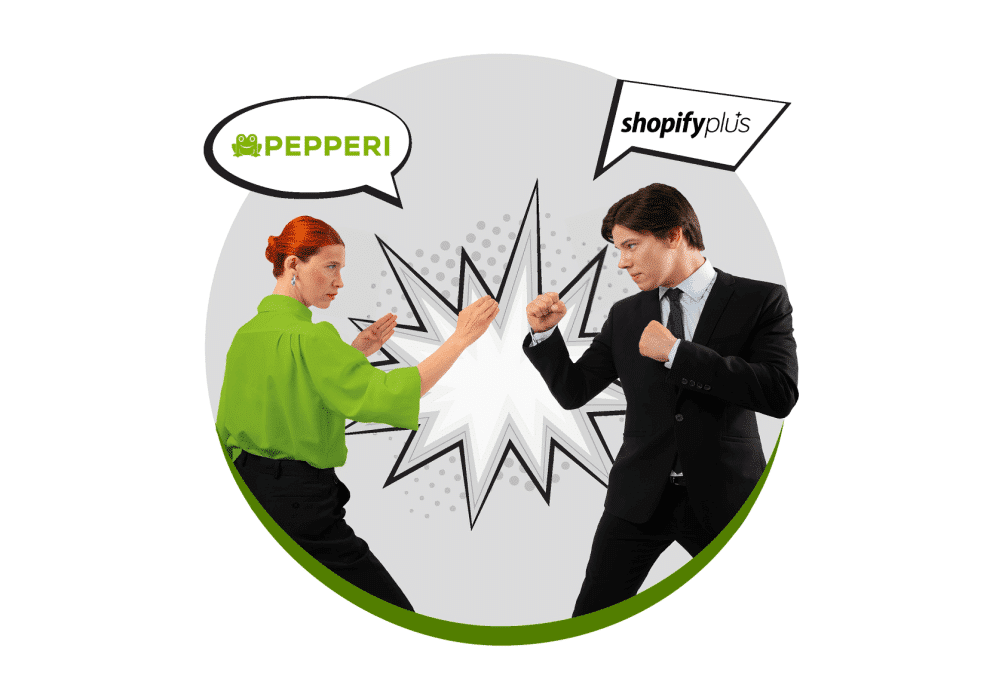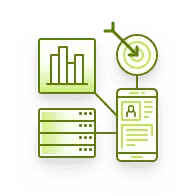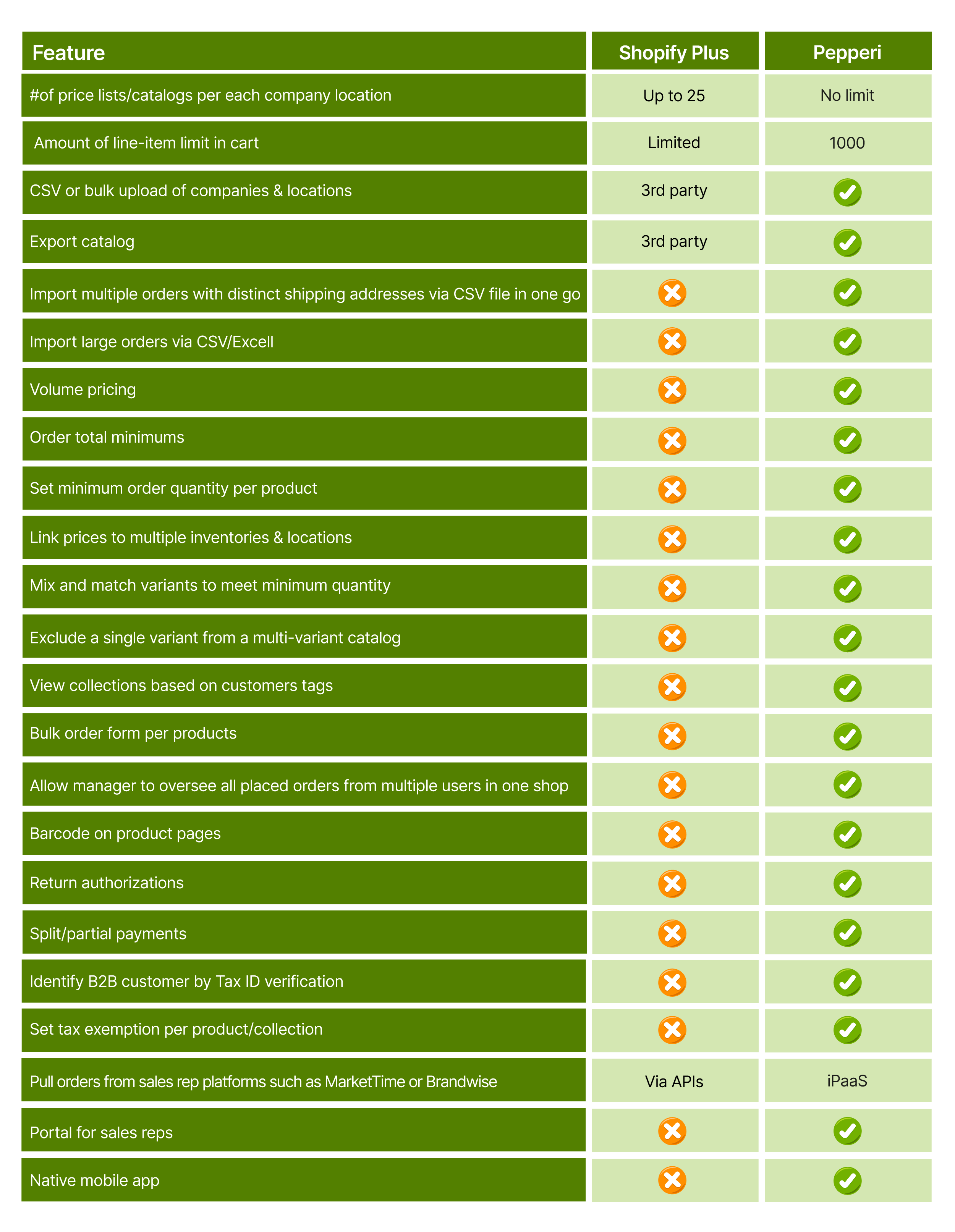A Competitive Analysis Pepperi B2B eCommerce vs Shopify Plus B2B
October 25, 2023 By Yana Persky

- You will understand that Shopify has historically focused on B2C and D2C markets and only introduced its B2B features in 2017, which has drawn criticism for lacking essential capabilities.
- You will undertsand the limitations of Shopify Plus B2B and recognize that Shopify Plus B2B struggles with key functionalities such as distinct price catalogs for different customers, integration with third-party applications and ERP systems, and limited customization for branding and design.
- You will understand the advantages Pepperi has to offer and discover how Pepperi is purpose-built for the B2B market, offering a robust Business Rules Engine that allows for complex workflows and customizable pricing structures, unlike Shopify.
Introduction
Shopify has been a prominent name in the world of eCommerce, primarily catering to B2C (Business-to-Consumer) and D2C (Direct-to Consumer) businesses for many years. The wholesale offering waraths introduced only in 2017 and was subject to some criticism by B2B companies.
In addition to its inability to provide distinct price catalogs for different customers, the Shopify Plus B2B Wholesale Channel lacks the capability to integrate with third-party applications or ERP systems, which are crucial for many B2B operations. Moreover, it doesn’t offer flexibility for branding and design customizations.
The Release of Shopify Plus B2B: What You Need to Know
It was only recently, likely after realizing the untapped potential of the B2B eCommerce market, that Shopify made initial efforts to address these shortcomings by introducing Shopify Plus for B2B. While this is a step in the right direction, the B2B features offered are still in their infancy and seem primarily geared towards DTC businesses seeking expansion into the B2B realm.
It remains somewhat unclear why DTC and B2C businesses would opt for the same vendor in the B2B scenario. The sole advantage in doing so lies in the convenience of sharing a product catalog. The goal is not to remain loyal to an existing B2C/DTC vendor merely because they’ve introduced new B2B features, but to explore pure-play B2B Commerce vendors that can address the needs of various stakeholders, including sales reps, buyers, van sales, and customer support – and can adapt to the diverse and specialized requirements of B2B customers within a unified ecosystem.
Shopify has been making significant investments in its research and development, with a team of around 4,500 dedicated employees and a robust R&D budget of $1.38 billion for the year 2022. This budget represented a remarkable 75% increase compared to the previous year.
In 2022, Shopify rolled out roughly 100 minor point releases along with major enhancements, showcasing their commitment to continuous B2B improvement.
However, despite these efforts, Shopify lacks core B2B functionality. It’s important to recognize that transitioning to a platform with specialized B2B features and requirements can be a complex and time-consuming process. The B2B space has distinct needs and nuances that differ significantly from the B2C and DTC markets that Shopify has historically focused on. This shift to B2B isn’t just a change in feature development; it’s a shift in perspective, as B2B necessitates a deep understanding of its unique complexities.
Pro Tip: Before choosing an eCommerce platform, thoroughly evaluate your business’s unique B2B requirements, including pricing structures, sales processes, and integration needs.
Key B2B eCommerce Features Comparison
Let’s take a closer look at Shopify Plus B2B and Pepperi’s B2B eCommerce platform, comparing their capabilities across 20+ parameters to assess how well they meet the requirements of B2B businesses.
Pro Tip: Seek platforms that offer a robust set of B2B features, such as a Business Rules Engine that allows for complex pricing, discounts, and order approvals. This can save time and reduce reliance on third-party applications, which can complicate processes and increase costs.
Pepperi B2B eCommerce vs Shopify Plus B2B: Which Should You Use?
We examined over 20 critical parameters that are essential for any online B2B business. These parameters encompass aspects that are notably lacking in Shopify, a platform historically more aligned with B2C and DTC ventures.
As we explored this in-depth comparison, it’s clear that Pepperi is designed with B2B needs in mind and delivers a comprehensive set of features required for the complex world of B2B commerce.
Pepperi outshines in many categories and emerges as a strong B2B eCommerce contender with additional unique strengths that set it apart from Shopify Plus B2B.
Business Rules Engine
Pepperi boasts a robust Business Rules Engine, which allows businesses to create highly configurable workflows, automate processes, and enforce business-specific rules. Whether it’s complex pricing structures, discount rules, or order approval processes, Pepperi’s Business Rules Engine can handle it with ease and ensure it aligns with the business’ evolving needs.
While Shopify Plus B2B offers a degree of configuration, it does not come close to Pepperi’s level of flexibility in implementing complex business rules and workflows. Shopify Plus B2B requires third-party apps and extensions for similar capabilities, leading to additional costs and complexities.
Native Mobile and Web Apps
Unlike Shopify that primarily relies on responsive web design, Pepperi provides native mobile and web apps for both sales reps and eCommerce buyers. This native approach ensures a seamless and consistent experience across various devices, allowing sales reps to take orders in the field, and buyers to place orders online with ease.
The native app offers offline access, ensuring that sales reps can take orders and access vital information even in areas with poor connectivity.
Sales Rep App
Unlike Shopify Plus B2B that lacks a dedicated portal for sales representatives, Pepperi B2B commerce solution provides comprehensive solutions for both sales representatives and buyers. Sales reps can use the platform to manage orders, access customer data, and conduct in-person or virtual sales meetings effectively.
Single Back Office for Sales Reps and B2B eCommerce
Pepperi’s unified platform brings together buyers and sales reps into a single, unified solution. This means that your sales reps have access to the same data and capabilities as your B2B eCommerce customers. This creates a more streamlined and consistent experience, simplifying operations and enhancing communication between teams.
Pro Tip: Evaluate Mobile and Offline Capabilities: Choose a platform that provides native mobile apps for sales reps and buyers. This feature is crucial for facilitating order management and accessing information in the field.
Summary
In conclusion, while Shopify Plus B2B is a well-known eCommerce platform with a broad range of capabilities, Pepperi is purpose-built for the B2B market, offering more comprehensive B2B features. With its robust business rules engine, native mobile and web apps, dedicated sales rep app and a single back office for sales reps and B2B eCommerce, Pepperi is a compelling choice for companies looking to migrate their B2B operations online. It’s clear that Pepperi’s comprehensive approach to B2B Commerce sets it apart from Shopify Plus B2B in this specific niche.
Rather than remaining loyal to existing B2C/DTC eCommerce vendors, businesses should seek out genuine unified B2B commerce solutions capable of effectively addressing the distinct needs of various B2B sales channels.
Pure B2B businesses, particularly mid-size companies and enterprises, with typical and complex B2B requirements are likely to find Shopify’s B2B offerings insufficient and immature for their needs. The gap between what Shopify offers and what B2B businesses require is still wide, leaving many in the B2B sector skeptical about committing to Shopify as their B2B eCommerce platform of choice.
Key Takeaways
- Although Shopify is investing heavily in research and development (with a significant budget and many updates), its B2B functionalities remain in the early stages and are insufficient for complex B2B requirements.
- Transitioning from B2C to B2B necessitates a different approach and understanding of the unique complexities within the B2B sector, which Shopify has not fully embraced.
- Pepperi is specifically designed for B2B commerce, offering a robust Business Rules Engine that allows for customizable workflows and complex pricing structures, which surpasses Shopify's capabilities.
- Pepperi provides dedicated native mobile and web apps for both sales reps and buyers, facilitating seamless order management and access to essential data, even offline, unlike Shopify's reliance on responsive design.
- Pepperi includes a dedicated portal for sales representatives, enhancing their ability to manage orders and customer interactions effectively, a feature that Shopify lacks.






























